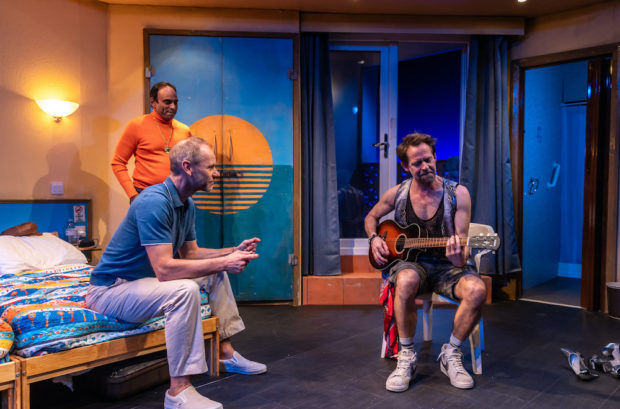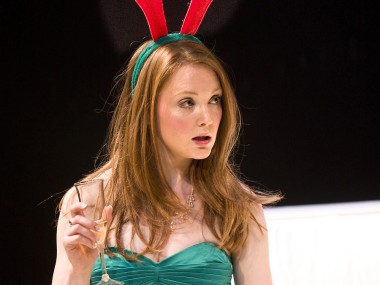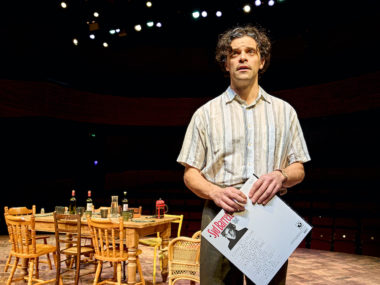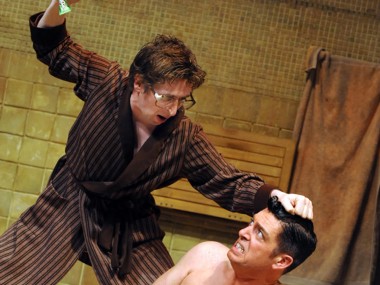Out of Season, Hampstead Theatre
Monday 26th February 2024

One island off the coast of Spain has more cultural oomph than all the rest put together. I’m talking about Ibiza, the sun-soaked, music-happy and drug-friendly paradise for anyone in their roaring luved-up twenties who wants a break that will fry their minds — and imprinting them with memories of sun, sex and ecstasy for years to come. Fair enough, but what happens when a group of guys decide to recreate this experience in their fifties? Well, that’s the subject of actor Neil D’Souza’s new comedy, Out of Season, which is currently playing in the Hampstead Theatre’s Downstairs studio.
Set in room 547, with its rhyming nickname of “stairway to heaven”, of the Hotel Pantinos, the plot begins with the arrival of old mates Chris and Dev, who have returned to the exact place where they partied 30 years previously because Chris wants to spend his 50th birthday there. As young students they, as well as Michael — now a big shot in the music industry who flies out regularly to LA — were in a band, and Chris still plays some of the songs he wrote with Dev, who has become a music lecturer at uni. Chris, who has never really grown up, teaches English as a foreign language. All have fond memories of their younger selves.
Although Dev says he feels like an old man, and has swapped sex for therapy (in which he explores his failure to create a family), Chris is a singleton with an eye for younger women, and is soon exploring the poolside offer. When he returns to the hotel room with mixed-race late 30s Holly and her older friend Amy, it looks like there’s going to be a party. But while these northern women provide a good dose of realism to balance the nostalgic vibe embraced by the boys, the play only hots up when the much-delayed Michael finally arrives. He turns out to be a study in toxic masculinity — and a violent confrontation is the predictable outcome.
The playwright D’Souza — who also plays Dev — has chosen to write a comedy which explores ideas about male friendship and masculinity. But although there are some guffaws to be had, he is not a naturally comedic writer and the atmosphere of the play is definitely not that of a bright laughter fest. Nor is the plotting up to much. So while it’s easily to mock the pretentions of Chris and Dev, and wince at their memories, it’s soon obvious that D’Souza’s themes are much darker and more unpleasant than those of a simple comedy.
Originally titled The Purgatory of Extended Youth, the play is actually quite a serious study in how some men, especially those that don’t have a family and kids of their own, have never really left the playground. Instead of growing up, becoming more mature, men like Chris just repeat the life they had as teenagers well into their fifth decade. It’s not so much a mid-life crisis as perpetual adolescence. So all the guys in this play, including Michael (who does have a family), relate to each other as boys, with obsessive banter and silly jokes that remind them of the past, when at least they were young and felt the glory of life’s possibilities.
The issue of banter, which has a wider social resonance because it’s frequently used to excuse very bad male behaviour, is an important theme. While many of the interactions between Chris, Dev and Michael involve some gentle teasing, the situation becomes much more disturbing — and much less gentle — as they get more and more pissed. With alcohol roaring through their veins they shed inhibitions as well as clothes (in one larky episode Amy ties up one of them semi-naked to the bed), but they also lose the usual social restraints. The result is that the bitter truth of their relationships, with the usual ingredients of mutual envy and contempt, come crashing into the room.
The toxicity of these male relationships, with their hidden anger bursting out in rage and racism, contrasts with the play’s portrait of the women: Holly is a party-loving mother who loves shots, but has to always be aware of the child she’s left behind in England, while Amy is quieter but — like Chris — has a musical past. She was once in a band in Hull, and can still croon nicely, as demonstrated by a duet version of “The House of the Rising Sun”. I imagine she’s a real belter when it comes to karaoke. I was less keen on the play’s two songs, one a cruel portrait of academics like Dev and the other a more wistful illustration of the idea of being off-season, metaphorically and literally.
The trouble with the music of Out of Season is that it tends to slow down the action, and the main problem with the writing is that it lacks subtlety and subtext. Everything is on the surface; everything is explained. This both undermines the comedy, and detracts from the emotional fierceness of the story’s revelations. Still, there are some enjoyable moments, such as the fancy dress adopted by our boys for the hotel’s karaoke night — and the dance sequences are a great reminder of the stomping power of banging dance tunes. I also like the way that coke-snorting Michael turns progressively uglier and uglier as the second half descends from nostalgia into vile truths.
This venue’s associate director, Alice Hamilton, directs with care and attention to the emotional tides lapping around designer Janet Bird’s colourful but tacky hotel room, and the performances of the cast clearly have integrity: Neil D’Souza’s insecure but truth-telling Dev, Peter Bramhill’s self-regarding Chris, James Hillier’s bully-boy Michael, Kerry Bennett’s down-to-earth Holly and Catrin Aaron’s no-nonsense Amy. Although the subject of masculinity and men behaving badly is a bit of a worn-out topic in contemporary British theatre, there are a couple of beautifully excruciating scenes. Just don’t expect much comedy.
This review first appeared on The Arts Desk




